More Photos from
|
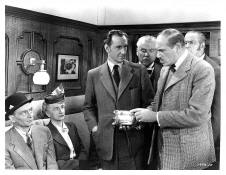 Shallcross confesses to having stolen a teapot. |
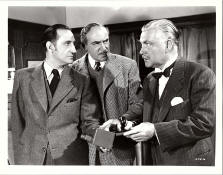 Holmes, Lestrade and Watson |
"This episode in the famous detective's career is told in a tight continuity and with flavorsome atmosphere ... Mr. Rathbone is silky smooth as usual." —Bosley Crowther, New York Times, February 9, 1946
"Basil Rathbone continues to be in tiptop form as Holmes, with the usual solid support from Nigel Bruce's amusingly befuddled Watson and a very capable supporting cast. Indeed, its only real flaw is that it comes so late in the series that a slight bit of ennui has set in; there's a tinge of 'been there, done that.'" —Craig Butler, Allmovie.com
|
Terror By Night This one follows the usual production pattern of previous Sherlock Holmes mysteries from Universal. It is standard for the series and will pay off in okay style. Roy William Neill, as producer-director, has given it good mounting for the budget and nice pacing. Action is all played on an English train, enroute to Scotland. Basil Rathbone, as Holmes, is guarding a fabulous diamond against jewel snatchers. With Holmes, to both help and hinder in his assignment, are dr. Watson (Nigel Bruce) and Inspector Lestrade, of Scotland Yard (Dennis Hoey). There are several murders before Holmes decides that killer is hiding in a double-bottom coffin and the brains is masquerading as a dumbwitted passenger. Rathbone's performance is a shade under his usual portrayal of the intrepid sleuth, but still satisfies. Bruce has a good hold on the bumbling Dr. Watson characterization. Renee Godfrey is interesting as a suspect, and others measure up. Script by Frank Gruber, based on the Sir Arthur Conan Doyle story, holds together well. Neill's direction wraps up all loose ends in finale as Holmes prepares for another adventure. Brog. —Variety, January 30, 1946 |
"Rathbone and Bruce are on fine form as ever, with the latter getting a kind of sidekick of his own in the equally-portly form of Alan Mowbray as an old chum, Major Duncan-Bleek. ... Terror by Night is good fun for the most part, with a decent array of suspects and clues to keep us guessing in its moderately atmospheric setting." —Richard Nelson, 100 Films in a Year
"A little more exciting than most Sherlock Holmes murder mysteries." —Wanda Hale, The New York Daily News, February 9, 1946
"The latest criminal doings involving Sherlock Holmes and Dr, Watson have been poorly conceived and only loosely put together." —Otis L. Guernsey, Jr., The New York Herald-Tribune, February 9, 1946
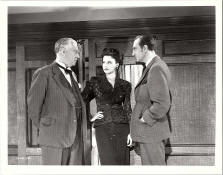 Holmes and Watson talk to Miss Vedder. |
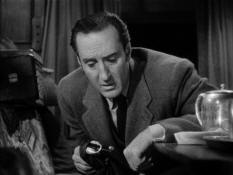 Holmes finds a clue. |
"Terror by Night combines all of the right ingredients in properly measured doses and emerges as a better-than-average, late-in-the-game Sherlock Holmes entry." —Tom Weaver, Michael Brunas and John Brunas, Universal Horrors: The Studio's Classic Films, 1931-1946 (McFarland, 2007)
"[The film is] too short to cause offense, but too slight to enthuse about." —Alan Barnes, Sherlock Holmes on Screen (Reynolds & Hearn, 2002)
"Features some pretty good banter between Holmes and Watson. Their performances make up for the decided lack of intricate plotting." —Mitch Lovell, The Video Vacuum
|
Terror by Night Universal Mystery 60 mins. AUDIENCE SLANT: (Adult) Another Sherlock Holmes mystery for the armchair detectives and followers of this type of fare. BOX OFFICE SLANT: Not one of the better in the series. Plot: Sherlock Holmes, commissioned to see that a fabulous diamond arrives safely in Scotland, boards the train which carries the diamond. When its owner is killed and the stone disappears, the detective, with the help of Dr. Watson, goes to work in his inimitable fashion and apprehends the crooks. Comment: The Sherlock Holmes series does not gain any statues with this latest offering, for it hasn't the action and suspense one expects to find in these murder-mysteries. Background is confined to the inside of a railroad car and this naturally hinders the action. But aside from that, although there are several murders, the story is too thin to hold the interest or build up suspense, and the solution a little too obvious. Basil Rathbone and Nigel Bruce give their customary smooth and natural performances in the roles of Holmes and Dr. Watson, and Dennis Hoey does okay as Inspector Lestrade of Scotland Yard. Alan Mowbray, Frederic Worlock and Renee Godfrey turn in worthy portrayals in supporting parts. Production and direction were handled by Roy William Neill. —Showmen's Trade Review, February 2, 1946 |
"Set on a train, it's a quintessential old-school whodunit, with all the passengers open to suspicion and each one looking guiltier than the last." —Emily Soares, "Sherlock Holmes in Terror by Night," Turner Classic Movies
"[Terror by Night] can be forgiven for its many flaws (including inconsistent scenery) because it proves to be an amusing entry in the series and possesses a winsome charm even as the convoluted plot gets even thicker when the train enters Scotland. It was fun trying to guess who was the jewel thief and therefore the infamous Moran, a mastermind who could be caught only by another mastermind." —Dennis Schwartz, Dennis Schwartz Movie Reviews
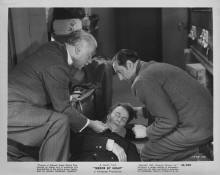 The baggage car guard has been killed. |
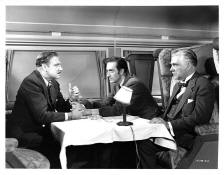 with Major Duncan-Bleek |
"The train setting is a classic for the murder mystery genre, and Terror By Night never disappoints, presenting just the right balance of shady suspects and dramatic set pieces." —Edward Carter, "On Basil Rathbone and Sherlock Holmes," dotmund
"Although low-budget (nearly all the film takes place on one set) this is an excellent little mystery." —Kris Davies, Quota Quickie
"Terror by Night is a crackerjack drawing-room mystery set on a passenger train, paced quickly and offering lots of red herrings, the occasional murder and a pleasing conclusion." —Michael Popham, The Horror Incorporated Project
|
Terror by Night The latest adventure of Sherlock Homes and his friend Doctor Watson is below average for this series in suspense, interest and entertainment value. Producer-director Roy William Neill depends too much upon interminable stock shots of trains, train wheels and engine gauges, which slow up the action and become increasingly tedious. Basil Rathbone and Nigel Bruce appear in their accustomed roles, as the British sleuth and his fumbling compatriot. Renee Godfrey, though she has little to do, is certainly easy to look at. Alan Mowbray contributes a convincing characterization, as does Dennis Hoey. The action of Frank Gruber's screenplay, based on a story by Sir Arthur Conan Doyle, is laid on a train bound for Scotland, and involves such characters as a British noblewoman, her son, a mysterious brunette, a retired Army officer, and assorted policemen. Holmes, employed to guard the noblewoman, who is transporting a fabulous gem to Scotland, meets with temporary failure when the gem is stolen and the noblewoman's son killed. The killer, a fairly obvious suspect from the first, is eventually apprehended after a hectic night for the train passengers. Seen at the studio. Reviewer's Rating, Average. —T. B. —Motion Picture Herald, February 2, 1946 |
"Rathbone acts cool and in control in a way that is pure joy to behold." —Fredrik, Silver in a Haystack
"Features a reliably sound performance from Rathbone as the master sleuth, less so for Bruce who’s too much of a babbling buffoon when playing Dr. Watson, and a good turn from the performer revealed to be the main culprit (no spoilers here). Contains the usual twists and turns—none too shocking—but banal direction and production values hold it back." —Cinecaps Digest
"Terror by Night is simply an entertaining Basil Rathbone as Sherlock Holmes movie with a wonderful tone which keeps it ticking over rather than the actual solving of the murder." —Andy Webb, The Movie Scene
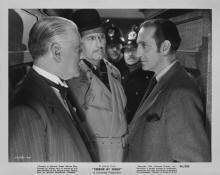 Inspector McDonald boards the train. |
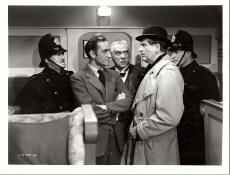 |
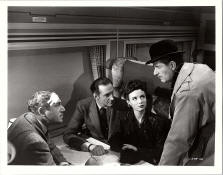 |
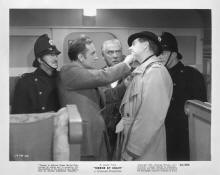 Holmes punches Inspector McDonald |
Go to Page Three: Posters and Lobby Cards
Back to page one, review of Terror by Night






